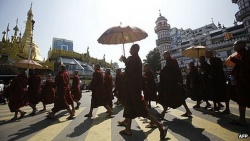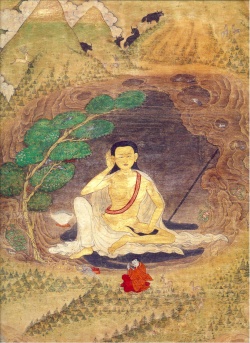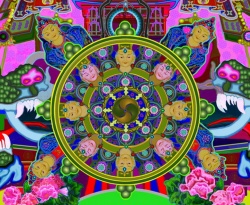What Happens When We Die?
The Buddha’s teachings offers the most satisfactory explanation of where man came from and where he is going. When we die, the mind, with all the tendencies, preferences, abilities and characteristics that have been developed and conditioned in this life, re-establishes itself in a new being. Thus the new individual grows and develops a personality conditioned both by the mental characteristics that have been carried over from the previous life and by the new environment. The personality will change and be modified by conscious effort and conditioning factors like education, parental influence and society but once again at death, it will re-establish itself as life in a new being. This process of dying and being reborn will continue until the conditions that cause it, the mental factors of craving and ignorance, cease. When they do, instead of being reborn, the mind attains a state called Nirvana
How does the mind go from one body to another?
When a person is dying, he begins to lose conscious control of his mental processes. There comes a time when his actions and habits locked away in his memories are released. In many instances, there arises in his mind a mental image. This image is totally involuntarily and is produced by his karma or past actions. Thus depending upon the nature of the particular karma that produces this image, the person may see dark shadowy figures, frightening images, or he may see his relatives or perhaps visions of scenic beauty. Quite often, he will cry out at these visions or remark about them to his visitors. Even though the physical body may be weak these thought units are very strong as death approaches. When the body finally breaks down at the point of death these energies are released as mental energy. As energy cannot be destroyed they have to re-establish themselves in a new body thus causing the phenomenon of rebirth.
Think of it being like radio waves which are not made up of words and music but energy at different frequencies, which are transmitted, travel instantaneously through space, are picked up by the receiver from where the radio produces them as words and music. It is the same with the mind. At death, mental energy travels through space, is picked up by the fertilized egg of the future mother, is reborn as a new being and manifests as a new personality.
Thus it is important that a dying person is comforted and reminded of his good deeds. He should not be made confused and visitors should not overtly grieve in his presence. Neither should unfamiliar ideas like a new religion be introduced to him. The Buddha advises that when one is fearful, he should recall to mind the Buddha, the Dhamma and the Sangha.
Is one always reborn as a human being?
No, there are several realms into which one can be reborn. Some people are reborn in heavenly planes, some are reborn in hell planes, some may be reborn as ghosts and as animals. Heaven is not a place but a state of existence where one has a subtle body and where the mind experiences mainly pleasure. Some religions strive very hard to be reborn in a heavenly existence mistakenly believing it to be a permanent state. But it is not. Like all conditioned states, heaven is impermanent and when one's life span there is finished, one could well be reborn again as a human. Hell, likewise, is not a place but a state of existence where one has a subtle body and where the mind experiences mainly anxiety and distress. Being a ghost, again, is a state of existence where the body is subtle and where the mind is continually plagued by longing and dissatisfaction. So heavenly beings experience mainly pleasure, hell beings and ghosts experience mainly pain and human beings experience usually a mixture of both. So the main difference between the human realm and other realms is the body type and the quality of experience.
"Those who imagine evil where there is none, and do not see evil where it is -- upholding false views, they go to states of woe. Those who discern the wrong as wrong and the right as right -- upholding right views, they go to realms of bliss. ~ Dhammapada 318,319"
What decides where we will be reborn?
The most important factor, but not the only one, influencing where we will be reborn and what sort of life we shall have, is karma. The word karma means 'action' and refers to our intentional mental actions. In other words, what we are is determined very much by how we have thought and acted in the past. Likewise, how we think and act now will influence how we will be in the future. Just as radio waves will be picked up by a radio tuned to its particular frequency, the mental energies released at the time of death will naturally be re-established in a new material body that most suits it. Thus, the gentle, loving type of person shall be reborn in a heavenly realm or as a human being in a comfortable environment. The anxious, worried or extremely cruel type of person is reborn in a hell realm, or as an animal, or as a human being born in extremely difficult environment.
Not only is there scientific evidence to support the phenomena of rebirth, it is the only after-life theory that has any evidence to support it. During the last 30 years parapsychologists have been studying reports that some people have vivid memories of their former lives. Professor Ian Stevenson of the University of Virginia's Department of Psychology has described dozens of cases of this type in his books. He is an accredited scientist whose 25 year study of people who remember former lives is very strong evidence for rebirth.
In buddhism, rebirth in heaven is not the ultimate goal precisely because rebirth in the different levels of heaven, though are happy destinations, they are ultimately impermanent and therefore unsatisfactory.
Our goal is not rebirth in a temporary realm but to liberate ourselves from all sufferings, afflictions, end the uncontrolled cycle of rebirth and attain complete awakening. That is why buddhas 佛 and bodhisattvas 菩萨 (like 释迦牟尼佛,阿弥陀佛,观世音菩萨) are very different from deities (神)
Many people because they have no knowledge of buddhism, are unable to differentiate between buddhas and deities (神佛不清). Buddha is known as the teacher of gods and men (天人之师) , even celestial beings and deities take Buddha as their teacher. Gods are not above samsara and suffering, only enlightened beings like the buddhas, bodhisattva, and arahant (阿罗汉)are liberated.
Deities can still have craving, anger and ignorance and suffering. Enlightened beings do not. Therefore enlightened beings are worthy of refuge, not deities, because deities have not overcome suffering and attained the highest happiness and wisdom, so how can they lead us to everlasting liberation and happiness? in fact those deities people worship in temples and communicate with are gui-shen, means they are ghost deities. ghost deities are simply ghosts with better karma, nevertheless they belong to the three lower realms, even lower than human realm - human realm is one of the three lower realms. so as my master said, if those ghost deities themselves do not have happiness, how can they truly bring happiness to others?
In fact many people are superstitious of deities, leading to a habit of reliance, superstitions, etc... This is very different from the Buddhist path of awareness and wisdom. We should not become superstitious over worldly gods.
Even today, there are living bodhisattvas and arahants. We as buddhists all aim to attain enlightenment and liberation and the highest happiness, this is truly possible... Even people in this forum have and are getting enlightened. as buddhists, we aim to develope wisdom, awareness and achieve liberation and true happiness.
When proof of rebirth was asked, Ian Stevenson’s research was often quoted. Prior to Ian Stevenson, how was rebirth proven?
There were also claims that non-Buddhists, free-thinkers, Greek philosophers could remember previous lives not to mention Chinese emperors and Indian spiritual gurus! We know the ancient sages of India had already taught the transmigration of soul. Buddhism does not subscribe to a permanent entity such as a soul but to a mind or consciousness that can flow to another being.
That said, the concept of rebirth originated from the 2nd NT – craving for existence. I would bring also the belief in 6 realms of existence to tie in with rebirth. These realms cannot be places or states of mind (as claimed by some texts) because if you look at ‘human’ and ‘animal’ realms, it just tells you existence of beings in different planes. Buddhism regards that when a being’s lifespan in one realm is over, that being might be reborn in another realm. The moving of one realm of existence to another endlessly is called samsara. To which realm one is reborn depends on his kamma. Hence, the concept of rebirth is never taught independently of kamma, samsara and dependent origination. To me all these doctrines were developed out of the 4NTs, and are inter-related. Hence, you will hear that these doctrines formed the fundamental tenets of Buddhism and that a Buddhist must accept them as ‘truth’.
While Buddhism strenuously emphasized that rebirth is not the same as reincarnation (transmigration) in that there is no such thing as a permanent soul, the very fact that another body (container) can hold a mind (consciousness) from another source, is NOT FAR FROM the concept of reincarnation. That a body (matter) can deteriorates and disintegrates is never a question but a mind or the stream of consciousness that can continue to exist and flow to another being is opened to question. It implies that the mind is an entity, a permanent one at that! Here, I detect a flaw. Energy is not a physical thing (matter) just like consciousness but if energy can be passed to a receiver like mind can be passed to a recipient (new body), then energy or mind has to be an ‘entity’ even if one does not called it a thing! And since energy does not wane or die, it has to be ‘permanent’.
The explanation that why many people cannot recall their past life is because they are caught up with the mundane life, i.e. the mind is too preoccupied with day-to-day affairs. Another explanation is that the ‘nature of mind’ does not allow one to recollect past lives. Yet another explanation is that our minds are overpowered by 5 hindrances such that our vision is earth-bound and hence cannot visualize previous lives. I find all these explanations to be contrite.
Rebirth is purely a doctrine like this: start with craving, this force propels the mind of a dying body to seek new abode. Until nirvana is attained, rebirth keeps going. Depending on your kamma, it decides which realm you re-become. Each rebirth affords you the opportunity to re-become in a different realm. Technically, a cockroach can re-become a human. And that is what I want to know - whether Ian Stevenson’s research includes cockroaches.




